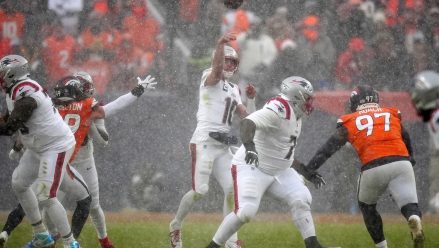One of the numerous open questions that will shape the future and legality of sports event contracts within derivatives markets, and their place alongside traditional, state-sanctioned U.S. sports betting, hinges on the applicability — or not — of the Federal Wire Act of 1961.
“These platforms [such as Kalshi] facilitate trading of contracts between individuals located in different states and are therefore arguably in violation of the federal Wire Act,” wrote Chris Cylke, the American Gaming Association’s senior vice president of government relations, in a letter to the CFTC that’s part of the public comments dossier for next week’s roundtable discussion on event contracts.
Meanwhile, “Kalshi’s sports event contracts also likely violate the Wire Act, §18 U.S.C. 1084(b), which requires sports wagers to be placed only in States where legal,” wrote New Jersey’s lawyers in their April 18 brief in opposition to Kalshi’s motion for an injunction seeking to preclude the state from blocking Kalshi’s offering of sports event contracts in the Garden State.
Neither of the above declarations (or many others like them) about the potential applicability of the federal Wire Act are definitive within the context of sports events contacts because, at this point, they cannot be.
Last week in a Forbes article titled “Kalshi’s Nevada Court Win May Be Short-Lived Due To Federal Wire Act Ban On Sports Betting,” gaming attorney Daniel Wallach made a good case for why the Wire Act might be, or should be, problematic for Kalshi, Robinhood, Crypto.com and other exchanges eyeing the prediction market opportunity.
However, Wallach left out the counter-arguments for why the Wire Act may be a total non-factor in the legal analysis about sports-related event contracts.
When federal statutes collide
The Wire Act prohibits anyone “engaged in the business of betting or wagering” from “knowingly using a wire communication facility for the transmission in interstate or foreign commerce of bets or wagers or information assisting in the placing of bets or wagers on any sporting event or contest.”
Well that seems like a problem. But not so fast.
“The rub here is that, if [sports event contracts] are legitimate hedging transactions under the Commodity Exchange Act (CEA), they do not involve ‘betting or wagering’ and, thus, do not trigger the Wire Act (or any other gambling laws),” said Dennis M. P. Ehling, a business litigation partner specializing in gaming law at Blank Rome.
“There is, I would say, quite some debate as to whether Congress intended to have any kind of what has traditionally been considered gambling that takes place in casinos — where the player has no underlying financial interest in the outcome of the game other than their stake in the e.g. Kalshi transaction — treated as not gambling because it is done by a CFTC-registered market operator. But if it is a hedging transaction, there is a strong argument that it is not a bet or wager.”
And if it is not a bet or a wager, then then what is it? Well, it’s an “event contract,” the kind of derivative or “swap” authorized for trading, all across the country, when listed on a Designated Contract Market (DCM) registered with the CFTC. That is what Kalshi has and will contend, at least.
Does this “event contract” seem to look, function, and get settled like a sports bet, or “meets all the requisites” of a bet or wager, as Wallach puts it? No doubt. (It is yet another, separate debate as to whether sports-related contracts even have the potential financial, economic, or commercial consequence such that they should be considered “swaps” in the first place.) But an event contract may, at the same time, in the eyes of Congress and/or a federal judge, meet the criteria for something different that does not trip the wire.
Gaming attorney Andrew Kim of the firm Goodwin Law, who specializes in appellate cases, federal, and gaming law, underscored the role of statutory interpretation.
“If you’re taking the position that the Wire Act forbids these transactions, and so these trades should not be allowed because doing so constitutes a bet or wager that’s transmitted interstate, well then you have a conflict between the Commodity Exchange Act and the Wire Act — and federal courts just hate conflict,” Kim told InGame. “They don’t like conflicting federal statutes.
“And so the question becomes, not can you interpret the Wire Act this way, but do you have to? And I think the answer to that is no.”
Analysis, in two Acts
After framing the analysis in those terms, Kim explained how a court might arrive at a determination that allows the CEA to regulate sports event contracts, without crossing wires with that other Act:
“The way you get to ‘no’ might seem overly simplistic, but I think it works as a whole. If it’s an event contract, it’s not a bet or a wager, right? It’s a swap. And there are different characteristics between the two types of instruments, right? A bet or wager, you either make it with a sportsbook or you do it peer to peer, but at the end of the day, it’s the stake being placed on the outcome of an event outside of your control. It’s contingent on that event, and you win a prize or you win a thing of value if the outcome resolves the way you select it, right? But there are other differences in terms of event contracts that are traded on markets.
“Because by and large, bets and wagers are not event contracts meant to be traded on markets where there’s going to be expected volatility, and there’s going to be a lot of trading activity … but not so much for bets and wagers. Aside from cash-outs and things like that, bets and wagers are generally locked in.
“Again, the question is not, ‘Do these contracts violate the Wire Act, but do they have to?’ I think there are enough differences that a federal court could easily get to saying, ‘No, they don’t,’ and find that there is no conflict between these two laws, because there are things that are different about these event contracts that makes them not bets or wagers. And when Congress wrote the Commodity Exchange Act, it did not intend — or even the special rule which came about in Dodd-Frank — it did not intend to create a system where the Wire Act would just eliminate these contracts. Congress does not write laws in a manner where one federal law would not take operation as a result of another federal law blocking it. That’s just not how it works.”
An analysis just like the one proferred by Kim is likely to come soon in either the federal court case between Kalshi and New Jersey, or the case between Kalshi and Nevada, which got underway a little bit sooner in March. Another case with similar if not identical issues just entered the tracks this week when Kalshi filed suit against Maryland regulators in response to an order to cease and desist from offering event contracts in the state, where a robust set of rules and regulations governs licensed sportsbooks that book millions of bets from the state’s inhabitants.
You may favor Kim’s take, or Ehlings, or Wallach’s, some combination, or someone from the LinkedIn peanut gallery. Of course, the applicability of the Wire Act also isn’t the beginning or end of the analysis for the viability of sports prediction markets taking root nationwide.
There are other very weighty matters such as preemption — when federal laws conflict with state laws, especially those furthering a state’s traditional “police powers” or exercising its traditional role in regulating “gaming” within its own borders. (Oh yeah, the meaning of the word “gaming” — that one is up for grabs as part of the “Special Rule” too.)
Of course we can’t conclude here with some wishy-washy “stay tuned” note, although that would be appropriate. Pressed to give some prediction on the way the CFTC will decide to weigh in on the Kalshi and Robinhood sports wave, Ehling took stock of the political landscape, and delivered the goods.
“To be honest, it is a bit of a wild guess what the CFTC is going to do here,” Ehling told InGame. “There is an undercurrent of anti-regulation and the sense from some conservatives that the authorizing statute gives an independent board like the CFTC too much broad, unguided discretion around what are or should be considered ‘gaming’ transactions or ‘excessing speculation,’ and I think that is going to be in the background of their decision, even if they decide they do not like what Kalshi/Robinhood are doing.
“The ‘burn it all down’ mantra of some proponents of the current administration will, I think, lurk in the background too,” Ehling continued. “On the other hand, there are dozens of states that stand to see their gaming regulation and license fees/taxes gutted if the CFTC ‘federalizes’ sports betting in this way. I candidly do not see any way that someone could rationally conclude that Congress intended what we are seeing here when it enacted the CEA. But Congressional intent is not in vogue these days as a basis to understand statutes, so that may not make much difference.”
Time to get wild and place your bets, because there’s another brief dropping soon in New Jersey and perhaps another Kalshi filing in another state soon, too.
“My wild guess is that the commission is going to punt on this,” Ehling said. “They will not take any action on Kalshi or Robinhood — I think they technically can still just decide not to block what they are doing — and will just let the interested parties fight it out in court. Or try to get a fix through Congress somehow. But I do not see the states/state gaming regulators backing down any time soon, either.”






